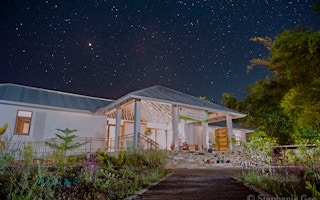The climate crisis and the pandemic are both the results of humanity’s destruction of nature.
Humans are depleting Earth’s natural resources, generating massive amounts of waste and toxic pollutants, causing large-scale biodiversity loss, and fundamentally changing the composition of our atmosphere and the health of our oceans.
Despite the hard-won public health gains of the past century, we are rapidly faced with the negative health impacts of higher temperatures, degraded air quality, threatened food production, more frequent natural disasters, and new infectious disease outbreaks.
As a consequence, humanity is more susceptible to malnutrition, mental health illness, and disease. Our health and survival are at risk as we dismantle the natural ecological systems upon which our health depends.
The good news is that innovative and replicable solutions exist – and the most effective amongst them are born out of the fundamental interdependence between the health of humans and nature.
One of the simplest, most effective, and risk-free solutions to global warming is to protect and expand Earth’s forests.
Healthy tropical and temperate forests are nature’s best offenses to out-maneuver global heating because trees naturally consume carbon dioxide from the increasingly polluted air we breathe. By some estimates, the world’s forests absorb around one-third of human-caused carbon emissions.
And one of the best ways to protect forests is, perhaps surprisingly, through innovative healthcare systems. Prioritising people’s health and well-being is a prescription for protecting rainforests and slowing climate change.
Unfortunately, public and global health practices in most countries have focused for decades on the individuals and populations of only one species, homo sapiens, to the neglect of our interdependence with nature and ecological determinants of health.
Fortunately, there is a vital example of what is possible when healthcare is built on an understanding of this interdependence.
In Indonesian Borneo, community-designed solutions to deforestation have halted rampant logging in a 108,000-hectare tropical rainforest—one of the most critical lungs of the planet—while simultaneously improving people’s health and reducing poverty.
In a project that began in 2007, financial and technical resources from high-income countries have helped implement community-built, intersectional approach to human and rainforest health.
In order to stop logging, the communities determined they required access to affordable, quality health care and training in organic farming and small business management.
Our organisation, Health In Harmony, built a medical centre staffed by Indonesians, where variable discounts on healthcare are based on changes in the rate of logging in each village. In addition, everyone can always access care with non-cash means such as tree seedlings, manure, or other goods and services.
Today these communities, and their rainforests, are flourishing. The Proceedings of the National Academy of Sciences of the US just published Stanford University’s analysis of the 10-year impact of this $5.2M program.
Between 2007 and 2017, infant mortality decreased 67 per cent in the medical centre’s catchment population of 120,000 people, and there were significant declines in diagnosed cases of malaria, tuberculosis, neglected tropical diseases, chronic obstructive pulmonary disease, and diabetes.
Logging households decreased 90 per cent, the loss of ancient forest halted and—significantly where the climate crisis is concerned—$65.3M worth of above-ground carbon was protected. The habitat for 3,000 critically endangered Orangutans was also preserved.
Monica Nirmala, a public health expert and the executive director of Indonesian partner Alam Sehat Lestari (ASRI) from 2014 to 2018 said, “The Stanford data support two important conclusions: human health is integral to the conservation of nature and vice versa, and we need to listen to the guidance of rainforest communities who know best how to live in balance with their forests.”
The social, economic, ecological and climate returns on the $5.2M price tag are remarkable. Michele Barry, director of the Center for Innovation in Global Health at Stanford said, “Health In Harmony’s innovative model has clear global health implications. Health and climate can and should be addressed in unison, and done in coordination with, and respect for, local communities.”
In 2007, Health In Harmony, which was founded on the understanding that human well-being and ecosystem integrity are one, along with ASRI, spent over 400 hours radically listening to people in 40 villages bordering Gunung Palung National Park (GPNP), in Borneo.
At the time, Borneo was experiencing one of the fastest rates of deforestation the world had ever known, and GPNP was losing tree cover at an alarming rate. This was mostly due to illegal, small-scale logging by people in marginalised communities on the edge of the park, who saw no other way to provide for themselves or to pay for healthcare.
In fact, between 1985 and 2001, this region had lost 60 per cent of its forest to illegal logging.
The critical link between the health of their communities and the health of the surrounding forests became obvious during the listening exercises. Their wisdom led to a partnership that improved their well-being and protected climate critical rainforest for all of us.
These results were recently noticed by the United Nations, who gave Health In Harmony a Global Climate Action Award for climate change leadership.
As we look for solutions to a healthy recovery from Covid-19 and as the climate crisis continues to gain momentum, Health In Harmony and ASRI are rapidly replicating this disruptive health system approach with rainforest communities in Indonesia, Madagascar and Brazil.
This is a model that addresses multiple Sustainable Development Goals (SDGS) while regenerating, rather than extracting, the Earth’s resources.
Our work makes it clear – the prevailing global health paradigm should shift to entrust Indigenous and local people to manage their ancestral lands with their own system’s approach to well-being – linking their health, household economy, occupation and rainforest, and creating the beginnings of restorative economies.
There is a role for all of us: in helping Indigenous peoples protect the lungs of the earth, together we can stabilise global heating and our climate.
Jonathan Jennings is the executive director of Health In Harmony, an international nonprofit that is improving human and environmental health with intertwined solutions. Dr. Kinari Webb is the founder of the nonprofit Health In Harmony.



















